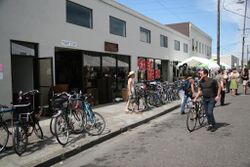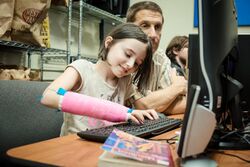Organization:Free Geek
| File:Freegeeklogo.gif | |
| Founded | 2000 |
|---|---|
| Founder | Oso Martin |
| Type | 501(c)3 |
| Focus | Sustainable technology reuse, digital access and education that demystifies technology. |
| Location | |
Area served | Portland Metro |
Exec. Dir. | Dan Bartholomew |
Employees | 30-40 |
Volunteers | 2000+ active |
| Website | freegeek |
Free Geek was founded as a non-profit organization by Oso Martin, and launched on Earth Day 2000 as part of a community-wide public event at Pioneer Courthouse Square in downtown Portland, Oregon . In September of that year Free Geek opened the doors to their facility on Southeast 10th Avenue as a recycling/reuse dropoff for electronic waste. In January 2001, The Oregonian ran an article advertising their free computer program for volunteers, which immediately became so successful that they had to start a waiting list. They currently have over 2,000 active volunteers per year.[1][2]
Over the past 17 years, Free Geek has expanded to fill its 22,000 square-foot home and grown into a community education hub, adding classes, internships, outreach programs, and free technology to low-income individuals and nonprofits to their ongoing commitment to sustainable reuse and recycling. Since their founding, they have:
- Diverted over 1.3 million items from landfills.
- Received over 900,000 hours of volunteer experience from 35,000 individuals.
- Granted over 72,620 technology devices to nonprofits, schools, community change organizations, and individuals, including over 10,000 computers to volunteers and students in exchange for community service.
Activities
Free Geek offers a wide range of free classes to its volunteers and to the general public. These classes generally fall into a few major categories including basic computer use, advanced computer courses, digital arts creation, digital nativity/online safety, and workplace readiness. Free Geek also offers phone and drop-in technical support on specific days of the week for the computers it produces.
Programs
People who wish to volunteer at Free Geek's community technology center usually choose between two programs: the Build Program and the Adoption Program. The Adoption Program allows volunteers to get to work immediately on relatively simple tasks, such as keeping incoming equipment organized or sorting metals and plastics. In the Build Program, volunteers learn while they work, and are trained to build refurbished computers. Volunteers completing the Adoption Program are given a computer after 24 hours of volunteering (one free computer per year)[3] while the Build Program volunteers get to keep the sixth computer they build.[4]
Free Geek has numerous other programs, which are generally run by interns, longer-serving volunteers and staff members. A few examples: The Hardware Grants program reviews requests for computer equipment from schools, churches, non-profit and community change organizations. The Reuse program works to ensure that reuse is prioritized over recycling, and finds new ways to get equipment into the hands of people who will put it to use. The Technocrats oversee the network infrastructure of the organization.
Recycling, Reuse & Resale
Free Geek is committed to keeping Oregon green. Raw materials are processed by volunteers in their warehouse, where approximately 40% of it is restored into usable technology. Some of it is sold, either online or in their Southeast Portland store, where proceeds support educational and outreach programs. Any materials which cannot be reused are recycled to the highest ethical, safety and sustainability standards, preventing it from entering our waste stream and poisoning the environment. Free Geek also donates refurbished computers and technology directly back into the community; in 2017, for example, Free Geek was able to give away six laptop computers for every ten sold in the Free Geek Store. In 2016 Free Geek donated 4,400 refurbished items of technology back to the community, providing free computers to low-income individuals, schools and nonprofit partners throughout the Portland Metro area and beyond.
Hardware Grant Program
Free Geek is committed to providing free technology equipment and support to organizations working hard to make the Portland, Oregon community a better place. The Hardware Grant Program connects qualifying nonprofits and schools with refurbished desktop computers, laptops, printers, and other equipment. Since their inception, they have granted more than 10,500 items to a total of over 2,000 nonprofits such as Black Lives Matter (Vancouver, WA), Bradley-Angle House, Habitat for Humanity, Hacienda CDC, Home Forward, KBOO Community Radio, Northwest Children's Theatre and School, Oxford House and Street Roots. 60% of grantees are based in the Portland Metro area; between 2012 and 2017, 25% of hardware grants went to schools or educational nonprofits, 18% to human services, 13% to arts & culture, 10% to community development, and the rest to a host of other sectors such as civil rights, animal welfare, health, faith-based organizations, and the environment.
Volunteers & Internships
Volunteers are the backbone of work at Free Geek, making the massive e-waste recycling operation possible. Since the founding in 2000, over 20,500 volunteers passed through the doors. In 2016 alone, over 2,000 active volunteers and interns gave more than 47,500 hours of their time to Free Geek.
The Volunteer Adoption Program offers a free computer to every volunteer after 24 hours of volunteer time. Each year Free Geek disburses around 550 computers (complete with monitor, speakers, keyboard, and mouse) specifically to volunteers who have completed their 24 hours of service. Many volunteers are low-income individuals who otherwise would not have the opportunity to own their own computer. To ensure that everyone has equal access, Free Geek works with each volunteer to accommodate a wide range of abilities, offering opportunities for people of all ages, from youth to senior citizens; of all backgrounds and experience levels, including those with little to no previous computer experience; volunteers in wheelchairs, with physical disabilities or with other specific accessibility needs; volunteers with developmental disabilities or who are on the autism spectrum or otherwise non-neurotypical; and volunteers who are most comfortable communicating in Spanish.
Free Geek also offers custom-tailored 3- to 6-month internship programs for skilled volunteers 16 years and up, designed to help develop vital job skills to help them pursue tech sector careers and make connections in the community.
Plug Into Portland
Founded in 2014, Plug Into Portland grew out of a collaborative partnership between Free Geek and Portland Public Schools, which expanded in 2017 to cover other Metro-area school districts such as Washington, Reynolds, David Douglas, and the Vancouver, WA area. This program addresses the digital literacy gap which hinders low-income K-12 students’ inability to learn because they do not have access to a computer at home. Students who volunteer for a total of 24 hours at any nonprofit organization in their community receive a free computer from Free Geek. Plug Into Portland is focused on quickly and easily getting computers into family homes, allowing students access to the technology they need to succeed in school and the means for their families to be involved in that success. This program served approximately 100 low-income students and families in 2016.
Earn-a-Computer
According to a 2014 Broadband Adoption Survey,[5] at least 15% of Portland-area residents do not have internet access at home, while at least 10% do not even have access to a computer. This population largely consists of vulnerable and at-risk communities: low-income families, youth, seniors, people of color, immigrants and refugees, people with disabilities, and English language learners. Lack of basic computer skills puts these populations at a stark disadvantage. In 2016, in partnership with the Multnomah County Library and a diverse group of community partners – including MetroEast Community Media, Home Forward, Human Solutions, Hacienda CDC, The Olseth Family Foundation, and NTEN (the Nonprofit Technology Network) – Free Geek launched the first cohort of our Earn-a-Computer (EAC) program, a five-week culturally-specific digital literacy curriculum designed to bring these vital skills directly into the communities who need them most and have least access to them.
Free Geek works with low-income housing community partners to identify and recruit cohorts of ten residents at a time, primarily elderly and immigrant populations who have little to no experience with computers. They offer as many options as possible to eliminate potential barriers to access and learning; they serve participants in their own neighborhoods, provide free food and childcare when needed, and offer both class instruction and written support materials in multiple languages, including English, Spanish, Kurdish, Somali and Russian. Over the course of four classes, participants learn to navigate the web, send their first email, and access ongoing resources like computer classes at the library and Free Geek. Each participant receives a free personal computer; during the final class, they help familiarize participants with their new technology, show them how to access free tech support from Free Geek, and make referrals to low-cost internet services.
In its first year, EAC provided over 1,500 teaching hours to over 150 students, grouped in cohorts of ten to allow for personalized instruction. Of those students, 87% were English language learners, 54% had no high school diploma or GED, and 95% had a household income of less than $30,000.
Community Education
Free Geek offers a wide and diverse range of free educational offerings that demystify technology and empower the community with the technology skills they need to succeed in all areas of life. Community partners in this work include ChickTech, Girls Inc., Impact NW, Oregon City Public Library, PLUG (Portland Linux-Unix Group) and Thinkful, who provide classes and workshops to participants in Free Geek’s educational programs. In basic digital literacy classes, Free Geek and volunteer instructors help individuals reach their own goals with technology; in more specialized offerings, Free Geek fosters the imagination of community members, sparks their interest in technology, and builds confidence that anyone can learn and work with computers. Current classes and workshops include such topics as "Anatomy of a Computer," programming with JavaScript and Python, web development, social media for organizations, data science, digital privacy and safety, graphic design and digital art. in 2016 Free Geek served nearly 1,700 students with over 4,000 classroom hours of instruction.
Free software
Free Geek's refurbished computers run Linux Mint, Ubuntu or other free and open-source software. The use of free software has several major benefits to the organization, and to the recipients of equipment: Free Geek operates without needing to devote resources to managing software licenses, and may install software where it is needed with minimal complications from legal considerations; and computer recipients get a wide range of software, which they may easily expand without paying money or entering into restrictive contracts.
Free Geek was the joint winner of the first Chris Nicol FOSS Prize awarded by the Association for Progressive Communications (APC) in 2007.[6]
Locations
In addition to Portland, a number of other cities have started their own Free Geek organizations.[7]
- Portland, OR ("the Mothership")
- Fayetteville, AR
- Chicago, IL
- Vancouver, BC
- Minneapolis-Saint Paul, MN
- Toronto, ON
- Providence, RI
- Ephrata, PA (South East Pennsylvania)
- Athens, GA (Free I.T. Athens)
- Oslo, Norway
- Detroit, MI
- Olympia, WA (Olygeek)
See also
- Empower Up
- World Computer Exchange
- Digital divide in the United States
- Global digital divide
- Computer recycling
- Electronic waste in the United States
References
- ↑ MacKinnon, Merry (March 2006). "Computer nerds, and proud of it". Lifestyles Northwest. http://wiki.freegeek.org/index.php/Lifestyles_Northwest_article. Retrieved 2006-12-26.
- ↑ Forsyth, Pete (May 4, 2001). "Free software, older computers help group narrow digital divide". The Portland Tribune.
- ↑ free geek volunteer http://www.freegeek.org/#volunteer
- ↑ Free Geek Build Program, Free Geek Website "Archived copy". Archived from the original on 2013-04-14. https://archive.is/20130414184859/http://www.freegeek.org/volunteer/build-program/. Retrieved 2012-07-31.
- ↑ "Oregon Broadband Adoption Report". https://www.portlandoregon.gov/revenue/article/501556.
- ↑ "Free Geek has been keeping the needy nerdy for seven full years". APCNews. http://www.apc.org/en/node/1862/.
- ↑ Free Geek Intergalactic
External links
- Free Geek
- BoingBoing article
- another BoingBoing article
- Welcome to Free Geek - short documentary video
[ ⚑ ] 45°30′37.27″N 122°39′21.63″W / 45.5103528°N 122.6560083°W



